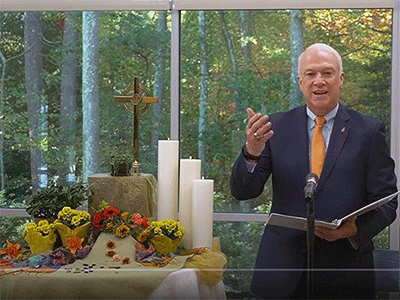Just ahead of Americans heading to the polls for Election Day, United Methodist delegates will be heading to five simultaneous jurisdictional conferences across the U.S. to elect new bishops.
Your support of the Episcopal Fund apportionment helps pay the salaries and benefits of United Methodist Bishops and allows them to travel across their episcopal areas providing mentorship and leadership.
But unlike during previous bishop elections, jurisdictional leaders are recommending that the delegates gathering Nov. 2-5 not fill every vacant episcopal office.
All told, 20 United Methodist bishops in the U.S. will have retired between 2021 and the end of this year. However, at this point, the recommendation is to elect 14 new bishops.
The elections will bring the number of active U.S. bishops up to 40, but the U.S. currently has 46 episcopal areas.

president, opens the special session of the Northeastern Jurisdictional
Conference on Oct. 15. The jurisdictional conference met online to
decide how many new bishops to elect when it and the four other
jurisdictions hold bishop elections across the U.S., starting Nov. 2.
Screengrab courtesy of the Greater New Jersey Conference via
YouTube by UM News.
It will be up to each jurisdiction’s college of bishops and committee on the episcopacy to arrange coverage of the remaining episcopal areas either by asking retired bishops to serve in an interim capacity or assigning bishops to serve more than one episcopal area as 16 bishops have done over the past two pandemic-marred years. All active bishops are eligible for reassignment at jurisdictional conferences.
Most jurisdictions also will have to vote on the number of bishops to elect when they meet next month.
Jurisdictional leaders are cautioning delegates to consider the long-term financial sustainability of adding more bishops as The United Methodist Church grapples with the ongoing effects of the COVID-19 pandemic and mounting church disaffiliations.
At the same time, many United Methodists have expressed a desire for fresh leadership to help take on the challenges the denomination faces.
Everything about this election season for bishops is unusual.
Typically, jurisdictional conferences meet to elect bishops in mid-July every four years following General Conference, the denomination’s top lawmaking assembly.
But amid General Conference’s pandemic-caused postponement to now 2024, U.S. bishops have taken on expanded assignments to ensure episcopal area coverage. The Council of Bishops, concerned about the sustainability of the Episcopal Fund that supports its work, initially recommended no bishop elections be held until 2024.
But after months of expanded workloads, the bishops asked the Judicial Council — the denomination’s high court — whether they had the authority to call jurisdictional conferences. In the meantime, reduced spending and increased giving helped shore up the Episcopal Fund.
With bishops stretched so thin, the Judicial Council agreed with the bishops that new elections need to be held to ensure the continuation of the episcopacy.
The new bishops will have to hit the ground running. Instead of taking office in September when they would have time to familiarize themselves with their new areas, bishops will be starting their assignments on Jan. 1 — the start of the season for bishops to appoint clergy.
Easterling told those gathered at the Northeastern Jurisdiction that she and her fellow bishops stood ready to welcome and work with new colleagues “to the glory of Almighty God.”
“Whatever the outcome of your discernment, there are no winners and there are no losers,” she said. “We are together in this sacred work.”
excerpt from a story by Heather Hahn, assistant news editor, UM News
One of seven apportioned giving opportunities of The United Methodist Church, the Episcopal Fund pays for bishops’ salaries, office and travel expenses, and pension and health-benefit coverage. Please encourage your leaders and congregations to support the Episcopal Fund apportionment at 100 percent.





